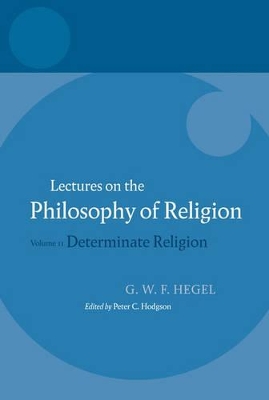Hegel Lectures
1 total work
The Hegel Lectures Series
Series Editor: Peter C. Hodgson
Hegel's lectures have had as great a historical impact as the works he himself published. Important elements of his system are elaborated only in the lectures, especially those given in Berlin during the last decade of his life. The original editors conflated materials from different sources and dates, obscuring the development and logic of Hegel's thought. The Hegel Lectures series is based on a selection of extant and recently discovered transcripts and manuscripts. The original lecture
series are reconstructed so that the structure of Hegel's argument can be followed. Each volume presents an accurate new translation accompanied by an editorial introduction and annotations on the text, which make possible the identification of Hegel's many allusions and sources.
Hegel's Lectures on the Philosophy of Religion represent the final and in some ways the decisive element of his entire philosophical system. His conception and execution of the lectures differed significantly on each of the occasions he delivered them, in 1821, 1824, 1827, and 1831. The older editions introduced insoluble problems by conflating these materials into an editorially constructed text. The present volumes establish a critical edition by separating the series of lectures
and presenting them as independent units on the basis of a complete re-editing of the sources by Walter Jaeschke. The English translation has been prepared by a team consisting of Robert F. Brown, Peter C. Hodgson, and J. Michael Stewart, with the assistance of H. S. Harris. Now widely recognized as the
definitive English edition, it is being reissued by Oxford in the Hegel Lectures Series. The three volumes include editorial introductions, critical annotations on the text, textual variants, and tables, bibliography, and glossary.
'Determinate Religion' comprises Hegel's treatment of world religions, starting with indigeneous or nature religions, moving on to religions of the Far East (Hinduism, Buddhism, Lamaism), the Near East (Persian, Egyptian, and Jewish religions), and the West (Greek and Roman religions). What Hegel succeeded in offering is not so much a history as a geography of religions, as demonstrated by the different schematic structures adopted in successive years.
Series Editor: Peter C. Hodgson
Hegel's lectures have had as great a historical impact as the works he himself published. Important elements of his system are elaborated only in the lectures, especially those given in Berlin during the last decade of his life. The original editors conflated materials from different sources and dates, obscuring the development and logic of Hegel's thought. The Hegel Lectures series is based on a selection of extant and recently discovered transcripts and manuscripts. The original lecture
series are reconstructed so that the structure of Hegel's argument can be followed. Each volume presents an accurate new translation accompanied by an editorial introduction and annotations on the text, which make possible the identification of Hegel's many allusions and sources.
Hegel's Lectures on the Philosophy of Religion represent the final and in some ways the decisive element of his entire philosophical system. His conception and execution of the lectures differed significantly on each of the occasions he delivered them, in 1821, 1824, 1827, and 1831. The older editions introduced insoluble problems by conflating these materials into an editorially constructed text. The present volumes establish a critical edition by separating the series of lectures
and presenting them as independent units on the basis of a complete re-editing of the sources by Walter Jaeschke. The English translation has been prepared by a team consisting of Robert F. Brown, Peter C. Hodgson, and J. Michael Stewart, with the assistance of H. S. Harris. Now widely recognized as the
definitive English edition, it is being reissued by Oxford in the Hegel Lectures Series. The three volumes include editorial introductions, critical annotations on the text, textual variants, and tables, bibliography, and glossary.
'Determinate Religion' comprises Hegel's treatment of world religions, starting with indigeneous or nature religions, moving on to religions of the Far East (Hinduism, Buddhism, Lamaism), the Near East (Persian, Egyptian, and Jewish religions), and the West (Greek and Roman religions). What Hegel succeeded in offering is not so much a history as a geography of religions, as demonstrated by the different schematic structures adopted in successive years.
